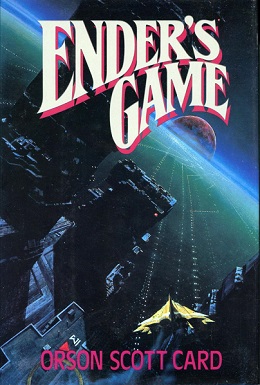
Ender's Game is a 1985 military science fiction novel by American author Orson Scott Card. Set at an unspecified date in Earth's future, the novel presents an imperiled humankind after two conflicts with an insectoid alien species they dub "the buggers". In preparation for an anticipated third invasion, Earth's international military force recruits young children, including the novel's protagonist, Andrew "Ender" Wiggin, to be trained as elite officers. The children learn military strategy and leadership by playing increasingly difficult war games, including some in zero gravity, where Ender's tactical genius is revealed.
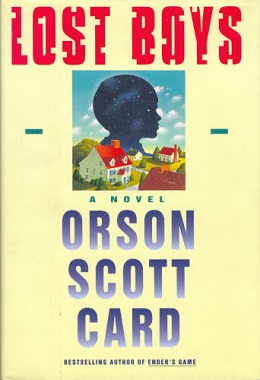
Lost Boys (1992) is a horror novel by American author Orson Scott Card. The premise of the novel revolves around the daily lives of a Mormon family, and the challenges they face after a move to North Carolina. The story primarily follows the family's troubles at work, church, and the oldest child Stevie's difficulty fitting in at school, which lead to him becoming increasingly withdrawn.
The Ender's Game series is a series of science fiction books written by American author Orson Scott Card. The series started with the novelette Ender's Game, which was later expanded into the novel of the same title. It currently consists of sixteen novels, thirteen short stories, 47 comic issues, an audioplay, and a film. The first two novels in the series, Ender's Game and Speaker for the Dead, each won both the Hugo and Nebula Awards.
Michael Lawson Bishop is an American writer. Over four decades and in more than thirty books, he has created what has been called a "body of work that stands among the most admired and influential in modern science fiction and fantasy literature."

Maps in a Mirror (1990) is a collection of short stories by American writer Orson Scott Card. Like Card's novels, most of the stories have a science fiction or fantasy theme. Some of the stories, such as "Ender's Game", "Lost Boys", and "Mikal's Songbird" were later expanded into novels. Each of the smaller volumes that make up the larger collection as a whole are centered on a theme or genre. For instance, Volume 1, The Changed Man, reprints several of Card's horror stories. The collection won the Locus Award in 1991.

InterGalactic Medicine Show was an American online fantasy and science fiction magazine. It was founded in 2005 by multiple award-winning author Orson Scott Card and was edited by Edmund R. Schubert from 2006–2016, after which Scott Roberts took over. It was originally biannual, but became quarterly in 2008 and bimonthly in 2009, except for a brief hiatus in 2010. The magazine ceased publication in June 2019.
Tim Pratt is an American science fiction and fantasy writer and poet. He won a Hugo Award in 2007 for his short story "Impossible Dreams". He has written over 20 books, including the Marla Mason series and several Pathfinder Tales novels. His writing has earned him nominations for Nebula, Mythopoeic, World Fantasy, and Bram Stoker awards and has been published in numerous markets, including Asimov's Science Fiction, Realms of Fantasy, Orson Scott Card's InterGalactic Medicine Show, and Strange Horizons.
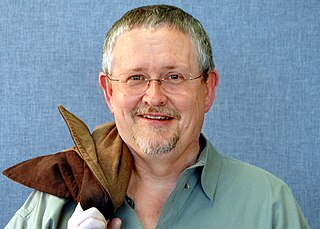
Orson Scott Card is an American writer known best for his science fiction works. He is the first and only person to win a Hugo Award and a Nebula Award in consecutive years, winning both awards for his novel Ender's Game (1985) and its sequel Speaker for the Dead (1986). A feature film adaptation of Ender's Game, which Card co-produced, was released in 2013. Card also wrote the Locus Fantasy Award-winning series The Tales of Alvin Maker (1987–2003).
The Orson Scott Card bibliography contains a list of works published by Orson Scott Card.

Empire is a 2006 dystopian novel by American writer Orson Scott Card. It tells the story of a possible Second American Civil War, this time between the Right wing and Left wing in the near future. It is the first of the two books in the Empire duet, followed by Hidden Empire with the video game Shadow Complex bridging the two.
"The Fringe" is a science fiction short story by American writer Orson Scott Card, originally published in the October 1985 issue of The Magazine of Fantasy & Science Fiction. It was later reprinted in his short story collection The Folk of the Fringe and in Future on Ice, a short story collection edited by Card.
"Ender's Game" is a science fiction novelette by American writer Orson Scott Card. It first appeared in the August 1977 issue of Analog magazine and was later expanded into the 1985 novel Ender's Game. Although it serves as the foundation of the Ender's Game series, the novelette is not considered to be properly a part of the Ender's Game universe, as there are many discrepancies in continuity between it and the novel.

A Different Flesh is a collection of alternate history short stories by American writer Harry Turtledove. The stories are set in a world in which Homo erectus, along with various megafauna, survived to the modern times in the Americas as the Native Americans along with any other human cultures.
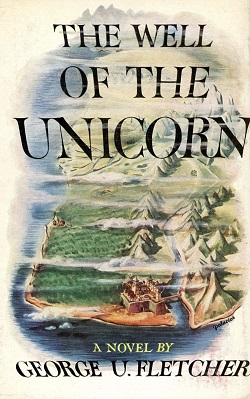
The Well of the Unicorn is a fantasy novel by the American writer Fletcher Pratt. It was first published in 1948, under the pseudonym George U. Fletcher, in hardcover by William Sloane Associates. All later editions have appeared under the author's actual name with the exception of the facsimile reprint issued by Garland Publishing in 1975 for its Garland Library of Science Fiction series. The novel was first issued in paperback in 1967 by Lancer Books, which reprinted it in 1968; subsequent paperback editions were issued by Ballantine Books. The first Ballantine edition was in May 1976, and was reprinted three times, in 1979, 1980, and 1995. The most recent edition was a trade paperback in the Fantasy Masterworks series from Gollancz in 2001. The book has also been translated into German, and into Russian in 1992.

The Ragged Astronauts is a novel by Bob Shaw published in 1986 by Gollancz. It is the first book in the series Land and Overland. It won the BSFA Award for Best Novel.

Pathfinder (2010) is a science fiction novel by American author Orson Scott Card. The novel tells the story of Rigg and his unusual ability to perceive the "paths" of living things throughout time. It is the first book in the completed Pathfinder series, and is followed by Ruins and Visitors.

Hamlet's Father is a 2008 novella by Orson Scott Card, which retells William Shakespeare's Hamlet in modernist prose, and which makes several changes to the characters' motivations and backstory. It has drawn substantial criticism for its portrayal of King Hamlet as a pedophile who molested Laertes, Horatio, and Rosencrantz and Guildenstern, and the implication that this in turn made them homosexuals.
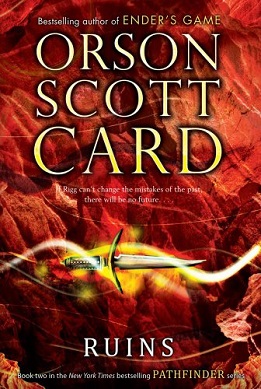
Ruins (2012) is a science fiction novel by American author Orson Scott Card, who is known for his novel Ender's Game. This novel continues the story of Rigg, and his strange powers. It is the second book in the Pathfinder series and is followed by Visitors, the first book is Pathfinder. The book was published on October 30, 2012.

Visitors is a science fiction novel by American author Orson Scott Card, who is best known for his novels, Ender's Game (1985) and Speaker for the Dead (1986). This novel continues the story of Rigg and his evolving ability to see and travel to the past, in an attempt to save the future. It is the third and final book of the Pathfinder series, preceded by Ruins and Pathfinder.
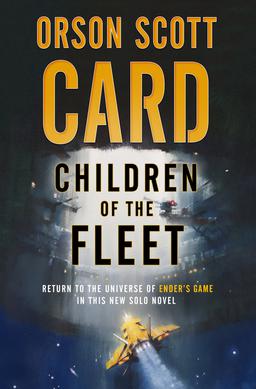
Children of the Fleet is a science fiction novel by American writer Orson Scott Card. The title of the novel was announced by the author on 12 November 2015, and it was released on October 10, 2017.













